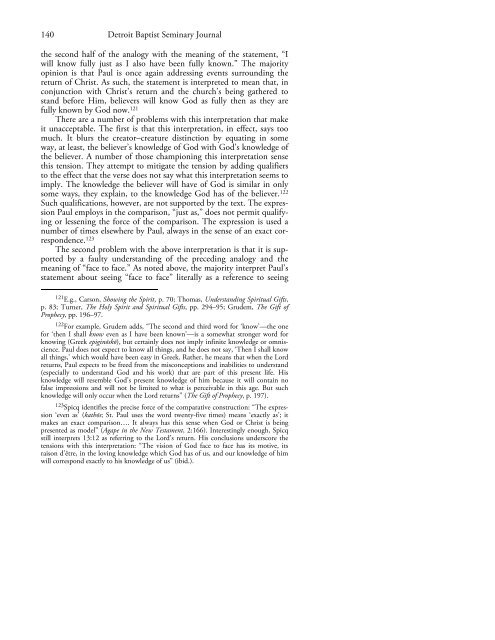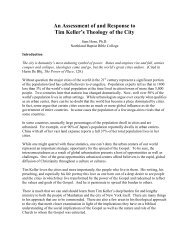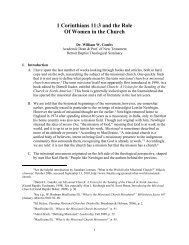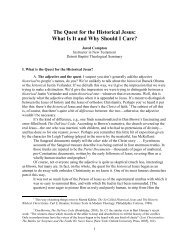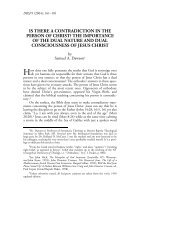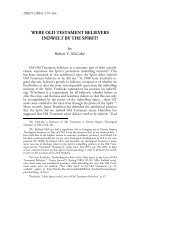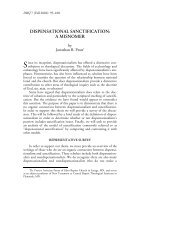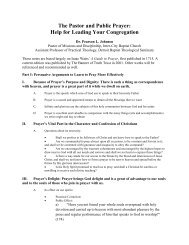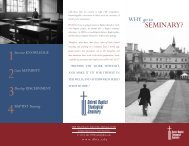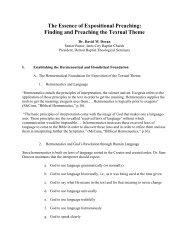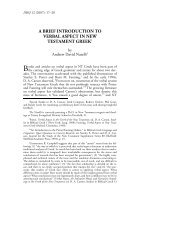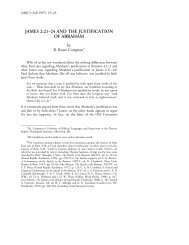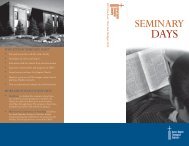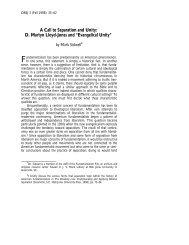1 Corinthians 13:8–13 and the Cessation of Miraculous Gifts
1 Corinthians 13:8–13 and the Cessation of Miraculous Gifts
1 Corinthians 13:8–13 and the Cessation of Miraculous Gifts
You also want an ePaper? Increase the reach of your titles
YUMPU automatically turns print PDFs into web optimized ePapers that Google loves.
140 Detroit Baptist Seminary Journal<strong>the</strong> second half <strong>of</strong> <strong>the</strong> analogy with <strong>the</strong> meaning <strong>of</strong> <strong>the</strong> statement, “Iwill know fully just as I also have been fully known.” The majorityopinion is that Paul is once again addressing events surrounding <strong>the</strong>return <strong>of</strong> Christ. As such, <strong>the</strong> statement is interpreted to mean that, inconjunction with Christ’s return <strong>and</strong> <strong>the</strong> church’s being ga<strong>the</strong>red tost<strong>and</strong> before Him, believers will know God as fully <strong>the</strong>n as <strong>the</strong>y arefully known by God now. 121There are a number <strong>of</strong> problems with this interpretation that makeit unacceptable. The first is that this interpretation, in effect, says toomuch. It blurs <strong>the</strong> creator–creature distinction by equating in someway, at least, <strong>the</strong> believer’s knowledge <strong>of</strong> God with God’s knowledge <strong>of</strong><strong>the</strong> believer. A number <strong>of</strong> those championing this interpretation sensethis tension. They attempt to mitigate <strong>the</strong> tension by adding qualifiersto <strong>the</strong> effect that <strong>the</strong> verse does not say what this interpretation seems toimply. The knowledge <strong>the</strong> believer will have <strong>of</strong> God is similar in onlysome ways, <strong>the</strong>y explain, to <strong>the</strong> knowledge God has <strong>of</strong> <strong>the</strong> believer. 122Such qualifications, however, are not supported by <strong>the</strong> text. The expressionPaul employs in <strong>the</strong> comparison, “just as,” does not permit qualifyingor lessening <strong>the</strong> force <strong>of</strong> <strong>the</strong> comparison. The expression is used anumber <strong>of</strong> times elsewhere by Paul, always in <strong>the</strong> sense <strong>of</strong> an exact correspondence.123The second problem with <strong>the</strong> above interpretation is that it is supportedby a faulty underst<strong>and</strong>ing <strong>of</strong> <strong>the</strong> preceding analogy <strong>and</strong> <strong>the</strong>meaning <strong>of</strong> “face to face.” As noted above, <strong>the</strong> majority interpret Paul’sstatement about seeing “face to face” literally as a reference to seeing121 E.g., Carson, Showing <strong>the</strong> Spirit, p. 70; Thomas, Underst<strong>and</strong>ing Spiritual <strong>Gifts</strong>,p. 83; Turner, The Holy Spirit <strong>and</strong> Spiritual <strong>Gifts</strong>, pp. 294–95; Grudem, The Gift <strong>of</strong>Prophecy, pp. 196–97.122 For example, Grudem adds, “The second <strong>and</strong> third word for ‘know’—<strong>the</strong> onefor ‘<strong>the</strong>n I shall know even as I have been known’—is a somewhat stronger word forknowing (Greek epiginōskō), but certainly does not imply infinite knowledge or omniscience.Paul does not expect to know all things, <strong>and</strong> he does not say, ‘Then I shall knowall things,’ which would have been easy in Greek. Ra<strong>the</strong>r, he means that when <strong>the</strong> Lordreturns, Paul expects to be freed from <strong>the</strong> misconceptions <strong>and</strong> inabilities to underst<strong>and</strong>(especially to underst<strong>and</strong> God <strong>and</strong> his work) that are part <strong>of</strong> this present life. Hisknowledge will resemble God’s present knowledge <strong>of</strong> him because it will contain n<strong>of</strong>alse impressions <strong>and</strong> will not be limited to what is perceivable in this age. But suchknowledge will only occur when <strong>the</strong> Lord returns” (The Gift <strong>of</strong> Prophecy, p. 197).123 Spicq identifies <strong>the</strong> precise force <strong>of</strong> <strong>the</strong> comparative construction: “The expression‘even as’ (kathōs; St. Paul uses <strong>the</strong> word twenty-five times) means ‘exactly as’; itmakes an exact comparison…. It always has this sense when God or Christ is beingpresented as model” (Agape in <strong>the</strong> New Testament, 2:166). Interestingly enough, Spicqstill interprets <strong>13</strong>:12 as referring to <strong>the</strong> Lord’s return. His conclusions underscore <strong>the</strong>tensions with this interpretation: “The vision <strong>of</strong> God face to face has its motive, itsraison d’être, in <strong>the</strong> loving knowledge which God has <strong>of</strong> us, <strong>and</strong> our knowledge <strong>of</strong> himwill correspond exactly to his knowledge <strong>of</strong> us” (ibid.).


